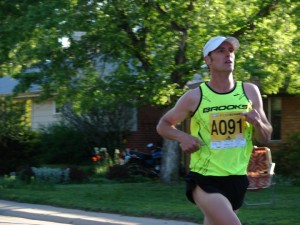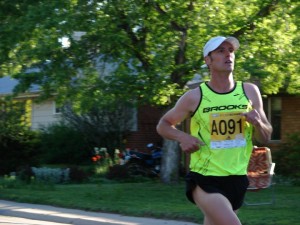Posts Tagged ‘proteins’
Whether you’re a triathlete, a recreational or endurance runner, or even a power walker, your body relies on proper fuel to do what you ask it to do. Training will take you only so far, no matter how religiously you do it. Here’s a surprising statistic I mentioned last week: nutrition counts for 80 percent of athletic training.
 A total of 45-65 percent of runners’ and walkers’ diets should be carbohydrate-rich foods. Carbs give us quick and long-lasting energy. They’re also easier for the body to use than proteins or fats.
A total of 45-65 percent of runners’ and walkers’ diets should be carbohydrate-rich foods. Carbs give us quick and long-lasting energy. They’re also easier for the body to use than proteins or fats.
I’ve always been an advocate of eating whole-grain foods – breads and pastas, wild rice, veggies, beans and oatmeal – but you must read labels carefully. Whole wheat does not equal whole grain.
Runners also need “good” fats, typically 20-30 percent of daily intake. Fat is energy for muscles, once quick-burning carbs have been used. Avoid trans fats. Heart-healthy omega-3s come in walnuts, flax seeds, cold-water fatty fish, soybean and canola oils and even tofu.
Don’t forget protein. A total of 15-35 percent of a runner’s diet should be lean proteins such as fish, poultry, low-fat dairy, nuts and seeds. Avoid foods high in saturated fats and cholesterol.
Find the percentages that work for you, and remember: hydration is key to the formula, and timing is everything. Drink early: do NOT wait for thirst to set in. Think of hydration as a pro-active commitment, not as a fix for thirst. Watch your urine: if it’s pale, you’re drinking enough water.
Always choose a pre-exercise meal that’s low in fat and fiber, is high carbohydrate and includes moderate protein. That’s the formula for endurance and energy.
While running, consume approximately 8 ounces of water every 15 minutes. If you’re exercising longer than an hour, alternate water and Gatorade about every 15-20 minutes. For high intensity workouts, I also suggest a sports drink like G2 (Gatorade2).
After running, you need 3 cups of fluid for every pound lost. Your body also needs protein and carbs (like chocolate milk and trail mix). A protein boost within 15-20 minutes of ending your workout will dramatically affect how your muscles rebuild and replenish.
The time period right after exercise – your short-term “recovery” window – is the most critical for improving your body. Training breaks down muscles, literally, and depletes natural energy stores (glycogen). During recovery, muscle tissue begins to repair and in so doing, strengthens. Energy replenishes.
Timing is key. Your short-term recovery window is only about 45 minutes, and can be wasted during a post-workout chat and/or drive home. Once this window closes, your muscles will no longer be receptive to the nutritional assistance you could have provided.
Bottom line: have a snack immediately following a workout that contains carbohydrate and protein, for this critical period. You’ll start to see a real change in your muscle tone, endurance and energy.
A good post-exercise meal, within 60-90 minutes, could be salmon, brown rice, broccoli, peppers and carrots. Let your body enjoy long-term recovery on “no-workout” days, while you focus on a healthy diet. And don’t skip meals. I personally eat six small meals a day.
Next week: nutrition for swimmers.
Intro to 3-Part Series: Nutrition for Running, Cycling, Swimming
Over the next four weeks, I’m going to talk about proper nutrition for a variety of sports: running, swimming and cycling. Many Floridians participate in one or more of these physically demanding (but fun) outdoor activities. A few combine them for triathlons – my cap’s off to you.
And here’s the thing. The human body can excel at a demanding sport only when fueled correctly. This may shock you, but proper nutrition is at least 80 percent of the formula for successful exercise and athletic training.
Don’t be misled by my use of the word “training.” If you’re a soccer mom taking a lot of classes to keep your tush looking toned, you are training. Dads who cycle five nights a week to keep the effects of aging at bay are training. And, of course, if you’re an individual or team athlete striving for wins, records, medals or the like, you know I’m speaking to you.
But you can train seven days a week – devoting hours and hours of your life to your pursuit – and without giving your body what it needs to support and achieve those goals, you will not end up where you want to be, including in the weight department. You may not even come close.
Picture Kyle Busch on the track in Indianapolis, and his car without the right kind of gas and fluids. Nothing in his driving skills can overcome the fact that his vehicle is not fueled for the task, and your body is no different.
Sports nutrition has many components. Sure, it’s important what foods you include in your daily diet, be they carbs, protein, fats, sugar or liquids. Carbs and proteins both have specific functions. We must understand what our body needs, how it uses what we give it and how we can maximize what it naturally provides. This is how we learn to boost our energy reserves so we can train harder, build lean muscle and avoid storing fat.
As important as what an active adult eats is the timing of when it’s eaten. I’ll talk about how and why to “pre-load” for a workout, and how nutrition can speed up post-activity recovery. Much of our body’s healing from exercise takes place while we sleep, so nutrition for proper sleep is also critical.
Next week, we’ll start with nutrition for running. (If you spend time on the treadmill in your gym, this will apply to you.) All my running readers will gain a real footing on the road to success. It starts with nutrition.
Back-to-school means back to the courts and fields for student athletes. Reaching peak athletic performance doesn’t mean you have bulk up on carbohydrates or chug the latest sports and energy drinks. Student athletes have unique nutritional needs, requiring approximately 2,000 to 5,000 calories per day, depending on body composition, amount of exercise and other health factors.
Here are some tips for fueling your body for optimal strength and energy:
-Eat a variety of foods including protein, carbohydrates, fats, calcium, minerals and vitamins; lean proteins, fruits and vegetables and dairy for calcium provide a balanced diet
-Avoid supplements and steroids, which can have negative side effects on your health
-Avoid extreme diets. Youth athletes require the proper amount of nutrition and depriving your body of proper nutrients can cause decreased energy, muscle loss and sometimes, more serious health problems
-Hydrate with water; avoid caffeine and sugary drinks
Before practices and games:
-Be sure to eat a small, balanced meal approximately 2 to 4 hours before the event and include proteins and carbohydrates such as a turkey sandwich, or pasta and tomato sauce
-No time for a meal? Eat a light snack less than 2 hours before the event such as low-fiber fruits, crackers or yogurt
-Hydrate by drinking plenty of water before, during and after sports activities; avoid caffeine
Because body sizes and activity levels vary from person-to-person, you need to alter your diet to fit your individual needs. For more information, visit http://www.mypyramid.gov/ and create a personalized plan that works best for you.



Follow Us!